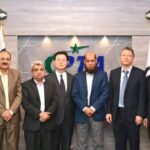ON BOARD PM’S AIRCRAFT, Dec 13 (APP): Prime Minister
Muhammad Nawaz Sharif on Sunday said the world’s future hinged upon this region due to its fast growing trade potential and greater connectivity linking Central Asian Republics with South Asia and China.
During an interview with media persons on board the aircraft during his return journey after ground breaking ceremony of the Turkmenistan-Afghanistan-Pakistan-India (TAPI) gas pipeline, the Prime Minister said the project had created a ‘win-win situation’ for the economies of its component countries.
He said about 2 to 3 billion people lived alone in South Asia and China with unprecedented potential to rise as a hub of the world’s rapid growing economies.
It was his cherished dream to forge strong connectivity and relationship with energy rich Central Asia and South Asia, he added.
With the completion of TAPI, the Prime Minister said, the energy requirements of Pakistan would be met. It would be a ‘game changer’ as the country would be able to get 1.3 billion cubic feet gas annually from it.
“With the clean energy supply, the power plants would work efficiently producing inexpensive power when compared to oil-run units. About 70 per cent energy needs would be met with this project,” he added.
Annually 1 billion dollar could be saved, which was by no means a little saving, he said.
To a question, the Prime Minister replied that he had also talked to the presidents of Tajikistan and Uzbekistan over his vision of enhanced connectivity, and they also appreciated and supported it.
“Every country should safeguard its economic interests and nations work for peace. Nowadays, the economic interests rule the world. Politics revolves around economy and without a sound economy, there is no progress,” he added.
About recent developments on Pak-India ties, Nawaz Sharif said they had taken a firm stand on the interests of Pakistan.
He maintained that Pakistan wanted good ties with all neighbours, including Afghanistan and India. The relationship with these countries unfortunately remained uneven in the last 65 years, but now it was hoped that the same would be settled.
“The issues can be settled on a negotiation table. On our principles, we are firm. In Paris, I told Indian PM Modi if you wanted to talk, we would also talk. It was followed by a meeting of NSAs (national security advisors) in Bangkok and then a visit of Indian External Minister Sushma to Pakistan improved things. The joint declaration was good and it is hoped that it would move forward,” he added.
About Afghanistan, the Prime Minister said that he had told Afghan President Ghani that they would help in bringing the Taliban to the negotiating table.
But he made it clear that they had absolutely no control over them, only through influence to some extent, they could bring Taliban to the negotiating table, he added.
Nawaz Sharif said he had held bilateral, trilateral and quadlateral meetings with heads of different countries on the Afghan issue, which were a part of Pakistan’s continuing efforts.
He, however, said it was not the sole responsibility of Pakistan, other countries should also share their responsibility in that regard.
He wondered how could Pakistan tolerate terrorism in someone’s country when it had remained a victim of the menace itself in which the nation rendered unprecedented sacrifices, besides its economy suffered colossal loss.
He said the Zarb-e-Azb operation was launched by his government as its moral obligation and not under any outer influence.
The Prime Minister said that under a wide political consensus in the shape of National Action Plan, the Constitution was amended and now the military courts were delivering verdicts.
Peace had been restored in Karachi and the residents there bore witness to it. The world leaders had also appreciated the government’s efforts in rooting out terrorism, he added.




